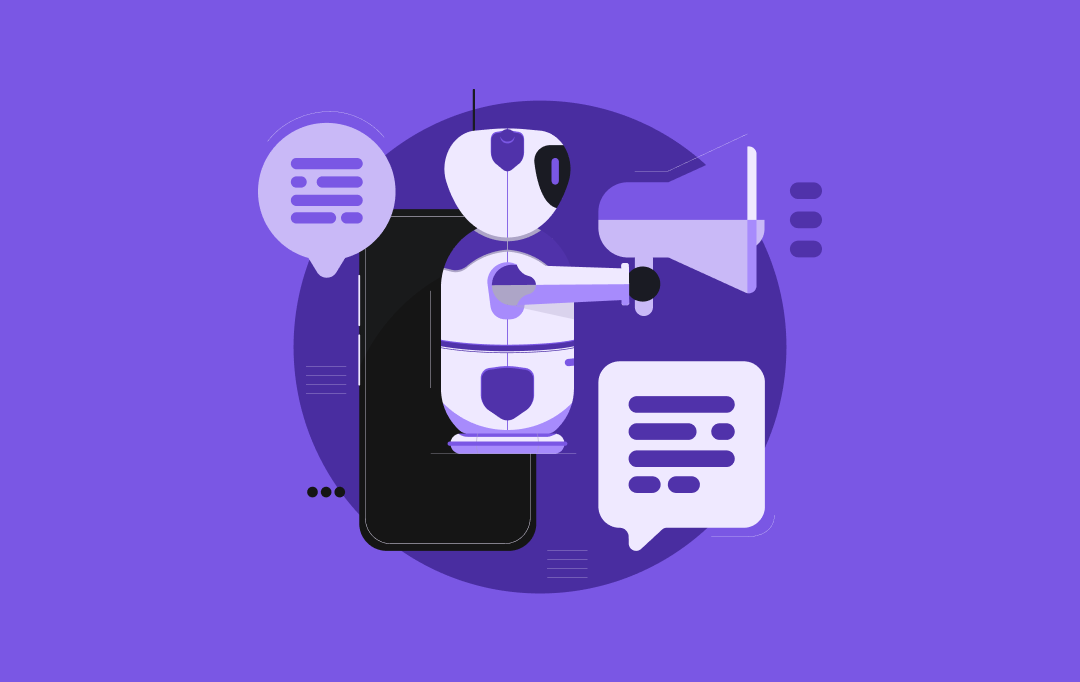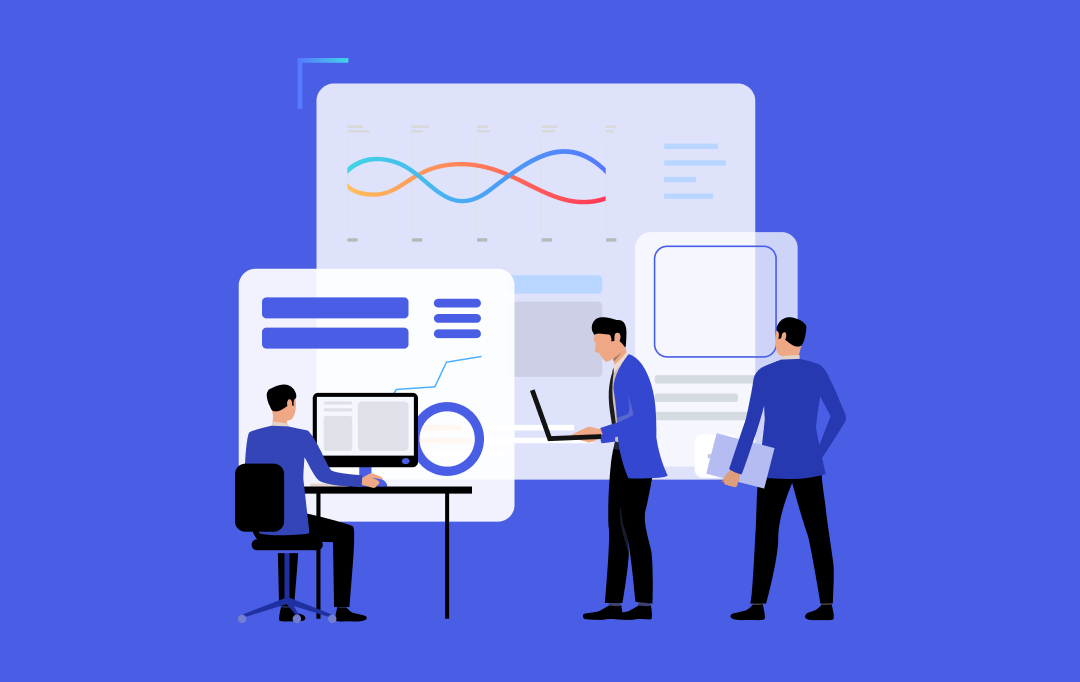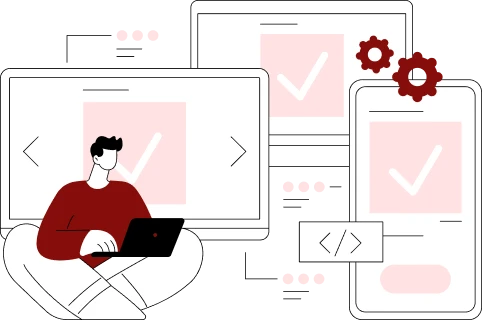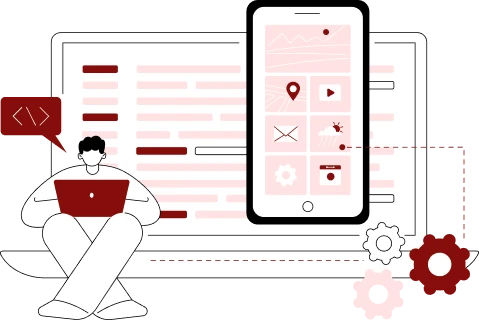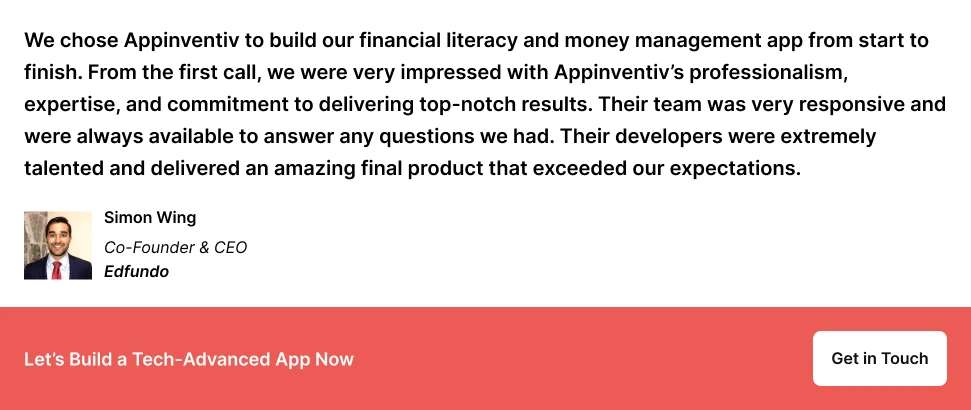- A Comprehensive View of the Costs Involved in Developing an App
- Unpacking the Price Tag: Key Factors Affecting the Cost to Develop an App in Canada
- Complexity of UI/UX Design
- Backend Development
- Security Measures
- Compliance Measures
- Platform Selection
- Technological Trends
- Complexity of Features
- Hidden App Development Costs You Must Consider
- App Maintenance
- App Hosting
- App Promotion and Marketing
- Legal and Licensing Fees
- Strategic Ways to Optimize Your App Development Investment
- Developing an MVP
- Prioritizing Necessary Features
- Leveraging Cross-Platform
- Outsourcing to Cost-Effective Regions
- How to Develop an App like SkipTheDishes, Lightspeed, Crave, or Any Major Mobile App of Your Industry
- 1. In-depth Discovery & Research
- 2. Advanced UI/UX Design
- 3. Complex Backend Architecture
- 4. Feature-Rich Development
- 5. Rigorous Testing & Quality Assurance (QA)
- 6. Scalable Deployment & Ongoing Management
- Appinventiv’s Experience in Building Apps for Various Industries
- Adidas eCommerce App
- Soniphi Vitality Health App
- 6th Street eCommerce App
- Edfundo Financial Literacy App
- Diverse Monetization Strategies for Canadian Mobile Apps
- Maximizing Your Investment: Calculating the ROI for Mobile App Development Cost
- Why Partner with an App Development Company like Appinventiv
- FAQs
Key takeaways:
- The cost to develop an app in Canada ranges from $40,000 USD ($54,000 CAD)
for a simple application to $400,000 USD ($540,000 CAD) for complex,
feature-rich platforms. - App complexity, design, features, platform choice, and team location are
significant factors affecting the cost of mobile app development. - Hidden costs like maintenance, hosting, and marketing are crucial to
budget for, typically accounting for 15-20% of the initial development
cost annually. - Adopting an MVP approach and leveraging cross-platform development can
significantly optimize your custom app development cost in Canada.
Canada’s mobile app market is experiencing unprecedented growth, with revenue reaching $$22.82 million in 2024 and projected to cross $52 million by 2030 (Source: Grand View Research). From Vancouver’s startup hubs to Montreal’s AI-driven innovation centers, businesses across industries are racing to launch mobile apps that captivate users and drive revenue.
With Canadian users spending more than 4.5 hours on apps per day, the opportunity for app-based businesses has never been greater. But as with any significant investment, the first question that invariably arises is: how much does it cost to develop an app in Canada? This isn’t a simple question with a single answer. The costs can vary significantly depending on various factors such as complexity, functionality, and development time.
On average, a simple app with basic features costs around $40,000 ($54,000 CAD), while a complex app with advanced features could climb to $400,000 ($540,000 CAD) or more. For enterprise-grade or large-scale global deployments, costs can extend well beyond $700,000 ($945,000 CAD). Understanding the comprehensive structure of mobile app development cost in Canada is crucial for making informed business decisions.
This guide provides you with a detailed breakdown of app development costs, hidden expenses, optimization strategies, and real-world insights to help you budget effectively for your mobile app project. Whether you are planning to make an app in Canada or outsource development, you’ll discover actionable information to navigate the Canadian app development landscape successfully.
On average, the cost to develop an app in Canada ranges from $54,000 CAD to $540,000 CAD, or more.
Discuss your project idea with us and get a more precise estimate.
A Comprehensive View of the Costs Involved in Developing an App
When planning to create an app in Canada, understanding the financial landscape is critical. App development generally falls into a few complexity categories, each with its own cost implications. Typically, the mobile app development cost in Canada ranges from $40,000 ($54,000 CAD) to $40,000 ($540,000 CAD), depending on various factors. Let’s break this down further:
Before diving deeper into app-specific pricing, you can also review our clear breakdown of custom software development cost in Canada for a full view of how budgets scale across different project types.
Simple Apps: These are basic applications with minimal features, a straightforward UI, and no backend database. Examples include a simple calculator, a basic note-taking app, or a flashlight app.
Cost Range: $40,000 – $75,000 USD ($54,000 – $101,250 CAD)
Medium Complexity Apps: These apps involve more features, user accounts, basic backend integration, APIs, and a more interactive UI. For example, a simple e-commerce app, a booking app, or a social media app with core functionalities.
Cost Range: $75,000 – $150,000 USD ($101,250 – $202,500 CAD)
Complex Apps: These applications boast extensive features, intricate backend architecture, multiple third-party integrations, real-time data synchronization, custom animations, and advanced security measures. Examples include ride-sharing apps, complex social networks, or enterprise-level solutions.
Cost Range: $150,000 – $400,000 USD ($202,500 – $540,000 CAD) or more.
Enterprise-Grade Apps: These are highly sophisticated, custom-built applications designed for large organizations to streamline internal operations, manage vast datasets, and often integrate with existing legacy systems. They prioritize robust security, scalability, and specific business logic. Examples include complex ERP (Enterprise Resource Planning) systems, custom CRM (Customer Relationship Management) solutions, supply chain management platforms, or intricate data analytics dashboards for large corporations.
Cost Range: $400,000- $945,000 ($540,000-$945,000 CAD) and upwards.
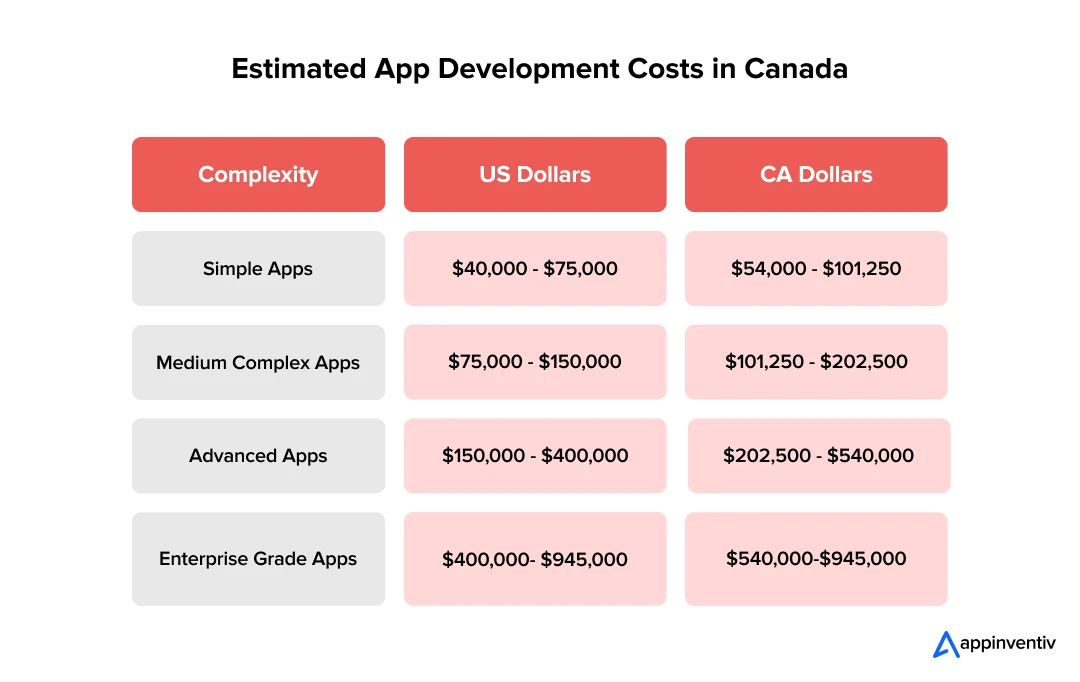
How to Get a Cost Estimate for App Development?
Estimating app development costs requires considering factors such as the app’s features, design complexity, and the type of platform you choose (iOS, Android, or cross-platform).
Formula for basic cost estimate:
| Cost Estimate = (Developers’ Hourly Rate) × (Estimated Hours) |
|---|
For instance, if the average developers’ hourly rate in Canada is $75 USD ($101.25 CAD), and you estimate 500 hours of work:
| Cost Estimate = 75×500 = 37,500 USD (50,625CAD) |
|---|
Unpacking the Price Tag: Key Factors Affecting the Cost to Develop an App in Canada
When it comes to the cost to develop an app in Canada, there’s no one-size-fits-all number. It’s like ordering a custom maple syrup latte—your choices shape the final bill. Let’s explore the key factors affecting the cost of mobile app development in Canada.

Complexity of UI/UX Design
A sleek, user-friendly design is non-negotiable in 2025. Simple designs with basic UI cost less, while custom animations and immersive UX drive up the app development cost in Canada. To give you a clear picture of the UI/UX design creation cost, here is a brief table:
| Design Type | Cost (USD) | Cost (CAD) |
|---|---|---|
| Basic UI | $5,000–$15,000 | $6,750–$20,250 |
| Custom UI/UX | $15,000–$50,000 | $20,250–$67,500 |
Backend Development
Backend infrastructure—APIs, servers, databases—is the engine of your app. Simple apps need minimal backend work, but complex apps with real-time data or AI require robust systems, increasing the custom app development cost in Canada.
| Backend Type | Cost Range (USD) | Cost Range (CAD) | Capabilities |
|---|---|---|---|
| Basic Backend | $10,000 – $25,000 | $13,500 – $33,750 | Simple database, basic APIs |
| Standard Backend | $25,000 – $60,000 | $33,750 – $81,000 | Complex database, multiple APIs |
| Enterprise Backend | $60,000 – $150,000 | $81,000 – $202,500 | Microservices, high availability |
Third-Party Integrations
Integrating third party APIs like payment gateways (e.g., Stripe), social media logins, or GPS add functionality but also costs. Each integration requires development and testing, impacting the cost to build an app in Canada.
| Integration Type | Cost (USD) | Cost (CAD) |
|---|---|---|
| Basic (e.g., social login) | $2,000–$10,000 | $2,700–$13,500 |
| Advanced (e.g., payment, GPS) | $10,000–$30,000 | $13,500–$40,500 |
Security Measures
With cyber threats on the rise, security is critical. In 2025, nearly every app faces security vulnerabilities, making robust measures essential. Integrating data encryption techniques, secure APIs, and compliance with GDPR or PIPEDA adds to the mobile app development cost in Canada.
| Security Level | Cost Range (USD) | Cost Range (CAD) | Features |
|---|---|---|---|
| Basic Security | $5,000 – $12,000 | $6,750 – $16,200 | SSL, basic encryption |
| Standard Security | $12,000 – $25,000 | $16,200 – $33,750 | Two-factor auth, data encryption |
| Enterprise Security | $25,000 – $50,000 | $33,750 – $67,500 | Advanced encryption, compliance |
Compliance Measures
Apps handling sensitive data (e.g., health or finance) must comply with regulatory standards like HIPAA, GDPR, and PIPEDA in Canada. Compliance integration, audits, and legal reviews increase the cost to hire an app developer in Canada.
| Compliance Type | Cost Range (USD) | Cost Range (CAD) | Requirements |
|---|---|---|---|
| Basic PIPEDA | $3,000 – $8,000 | $4,050 – $10,800 | Privacy policy, consent mechanisms |
| Industry Compliance | $8,000 – $20,000 | $10,800 – $27,000 | Healthcare, finance regulations |
| Enterprise Compliance | $20,000 – $40,000 | $27,000 – $54,000 | SOC 2, ISO 27001 certification |
Platform Selection
Choosing between iOS, Android, or cross-platform development affects costs. Cross-platform frameworks like Flutter or React Native can reduce the app development cost in Toronto or elsewhere by up to 30%.
| Platform Strategy | Cost Range (USD) | Cost Range (CAD) | Market Reach |
|---|---|---|---|
| iOS Only | $40,000 – $150,000 | $54,000 – $202,500 | Estimated 60% Canadian market |
| Android Only | $35,000 – $140,000 | $47,250 – $189,000 | Projected 40% Canadian market |
| Cross-Platform | $50,000 – $200,000 | $67,500 – $270,000 | Typically, 100% market coverage |
Technological Trends
Incorporating advanced technologies like Artificial Intelligence (AI), Machine Learning (ML), Augmented Reality (AR), or Internet of Things (IoT) will add to the complexity and thus the custom app development cost in Canada. For instance, Gartner predicts that by 2028, 33% of enterprise software applications will include agentic AI. This signifies the growing importance and adoption of AI in app development.
Also Read: How to Build an AI App? Steps, Features, Costs, Trends
| Technology Type | Cost Range (USD) | Cost Range (CAD) | Applications |
|---|---|---|---|
| AI/ML Integration | $15,000 – $50,000 | $20,250 – $67,500 | Chatbots, recommendations, analytics |
| AR/VR Features | $20,000 – $80,000 | $27,000 – $108,000 | Virtual try-ons, immersive experiences |
| IoT Connectivity | $10,000 – $40,000 | $13,500 – $54,000 | Smart device integration, sensors |
| Blockchain Integration | $25,000 – $100,000 | $33,750 – $135,000 | Cryptocurrency, smart contracts |
Complexity of Features
This is arguably the most significant driver of the cost to develop an app in Canada. Every feature, from user registration to real-time chat, requires design, development, and testing that increase the cost. Here is an estimated cost of app development based on features in Canada
| Feature Complexity | Cost Range (USD) | Cost Range (CAD) | Examples |
|---|---|---|---|
| Basic Features | $2,000 – $8,000 | $2,700 – $10,800 | User auth, basic CRUD operations |
| Intermediate Features | $8,000 – $25,000 | $10,800 – $33,750 | Push notifications, file uploads |
| Advanced Features | $25,000 – $80,000 | $33,750 – $108,000 | Real-time chat, video streaming |
| Enterprise Features | $80,000 – $200,000 | $108,000 – $270,000 | Advanced analytics, AI recommendations |
Hidden App Development Costs You Must Consider
Beyond the primary development expenses, several hidden costs can significantly impact your total investment in mobile app development in Canada. These often-overlooked expenses can add 20-30% to your initial budget, making it crucial to plan for them from the project’s inception.
App Maintenance
Mobile app maintenance cost in Canada typically accounts for 15-20% of the initial development cost annually. Regular maintenance ensures your app remains functional, secure, and competitive in the evolving mobile landscape.
- Bug fixes and minor updates: $500-1,500 CAD/month
- Feature additions: $2,000-8,000 CAD per feature
- OS compatibility updates: $3,000-10,000 CAD annually
- Security patches: $1,000-3,000 CAD quarterly
- Performance optimization: $2,000-5,000 CAD quarterly
App Hosting
Cloud hosting costs vary based on user base and data requirements. As your app grows, hosting expenses scale accordingly, requiring careful planning for sustainable growth.
- Basic hosting (up to 10K users): $100-500 CAD/month
- Scalable hosting (10K-100K users): $500-2,000 CAD/month
- Enterprise hosting (100K+ users): $2,000-10,000 CAD/month
- Content Delivery Network (CDN): $200-1,000 CAD/month
- Database hosting: $300-1,500 CAD/month
App Promotion and Marketing
Launching an app successfully requires substantial marketing investment to achieve visibility in crowded app stores and attract target users.
- App Store Optimization (ASO): $2,000-5,000 CAD
- Digital marketing campaigns: $5,000-20,000 CAD/month
- Influencer partnerships: $3,000-15,000 CAD per campaign
- PR and media outreach: $2,000-8,000 CAD/month
- Social media marketing: $1,500-6,000 CAD/month
- Paid advertising (Google/Facebook): $3,000-15,000 CAD/month
Legal and Licensing Fees
Canadian businesses must consider various legal requirements and licensing costs to ensure compliance and protect intellectual property.
- Privacy policy and terms of service: $1,500-5,000 CAD
- Trademark registration: $1,000-3,000 CAD
- App store fees: $135 CAD (Apple) + $35 CAD (Google) annually
- PIPEDA compliance consulting: $3,000-10,000 CAD
- Software licensing: $500-2,000 CAD annually
- Legal review and contracts: $2,000-8,000 CAD
Strategic Ways to Optimize Your App Development Investment
The mobile app development cost in Canada can be substantial, but smart strategies can help you stay within budget without compromising quality.
Developing an MVP
A Minimum Viable Product (MVP) is a version of your app with just enough features to satisfy early adopters and provide value. The goal is to gather validated learning about your customers with the least effort and cost. By focusing on core functionalities first, you can launch faster, test your idea, and iterate based on real user feedback. This significantly reduces your initial cost to build an app in Canada and mitigates risk.
Prioritizing Necessary Features
Instead of trying to build every conceivable feature at once, prioritize. Identify the “must-have” features that address your core user problem and differentiate your app. Future iterations can then incorporate “nice-to-have” features as your app gains traction and generates revenue. This phased approach helps control your custom app development cost in Canada.
Leveraging Cross-Platform
As discussed earlier, cross-platform frameworks like Flutter and React Native allow developers to write a single codebase that runs on both iOS and Android. While native development offers superior performance for highly complex apps, cross-platform development can significantly reduce development time and cost for many applications.
This often helps you save 20-30% compared to building two separate native apps. This directly impacts the overall app development cost in Canada.
Outsourcing to Cost-Effective Regions
While developing locally in Canada offers benefits like ease of communication and cultural alignment, outsourcing can provide significant cost savings. Countries with lower hourly rates for skilled developers, such as those in Eastern Europe or India, can drastically reduce your cost to hire an app developer in Canada.
However, it’s crucial to balance cost savings with factors like communication barriers, time zone differences, and quality assurance. Many Canadian companies successfully leverage a hybrid model, managing development locally while outsourcing certain components.
How to Develop an App like SkipTheDishes, Lightspeed, Crave, or Any Major Mobile App of Your Industry
Let’s imagine you want to build an app with the functionality of a major player like SkipTheDishes (on-demand delivery), Lightspeed (e-commerce/POS solutions), or Crave (streaming). The processes involved are complex, but understanding the steps can help clarify the investment. Here is a brief overview of the steps involved in making an app in Canada.
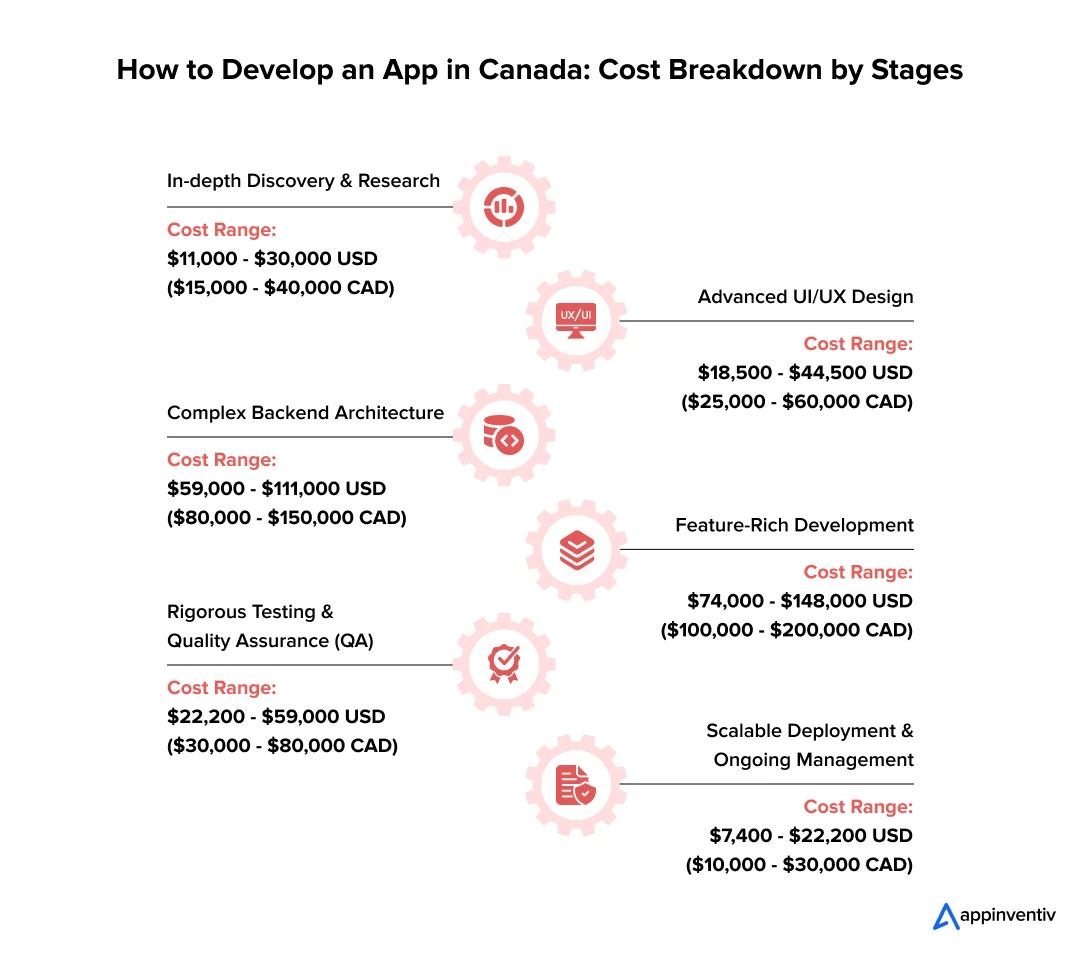
1. In-depth Discovery & Research
Cost Range: $11,000 – $30,000 USD ($15,000 – $40,000 CAD)
This initial phase is all about understanding the “what” and “why” before you even think about the “how.” It involves deep dives into market trends, checking out what competitors are doing, mapping out every possible user journey, and figuring out the technical feasibility.
For a streaming app like Crave, this means researching content licensing, digital rights management (DRM), and the nitty-gritty of streaming infrastructure. For a delivery app like SkipTheDishes, it’s about untangling complex real-time logistics, delivery zones, and dynamic pricing algorithms. This crucial step lays the groundwork, preventing costly detours later on.
2. Advanced UI/UX Design
Cost Range: $18,500 – $44,500 USD ($25,000 – $60,000 CAD)
Here’s where your app starts to take shape visually and functionally. This isn’t just about making it look pretty; it’s about crafting a seamless, intuitive, and highly personalized experience across countless screens and functionalities.
Crave’s effortless content navigation and personalized recommendations, or SkipTheDishes’ fluid order tracking and restaurant Browse – these are prime examples of sophisticated design that prioritize the user. This phase ensures your app is not only easy to use but also delightful.
3. Complex Backend Architecture
Cost Range: $59,000 – $111,000 USD ($80,000 – $150,000 CAD)
This is the hidden powerhouse of your app. We’re talking about building a super-scalable and highly secure server infrastructure that can handle millions of users and massive amounts of data. It involves advanced database management, developing APIs to connect with various third-party services, and setting up robust security protocols to protect all that valuable information.
For a streaming app, this means a global content delivery network. For a delivery or e-commerce platform, it’s the engine behind real-time order processing, inventory management, and secure payment processing. This phase is critical for performance and reliability.
4. Feature-Rich Development
Cost Range: $74,000 – $148,000 USD ($100,000 – $200,000 CAD)
This phase is where the core functionalities of your application are meticulously engineered and brought to life. It’s often the most intensive part of the development process, as it involves crafting the sophisticated capabilities that will define your app’s value and user experience. This includes implementing everything from robust user management systems and secure transaction capabilities to advanced data processing and real-time interactions, ensuring the app performs seamlessly under heavy demand.
Here’s a breakdown of common features found in complex mobile applications and their typical development cost ranges in Canada:
| Feature Category | Specific Features (Examples) | Estimated Cost Range (USD) | Estimated Cost Range (CAD) |
|---|---|---|---|
| User Management & Security | User registration/login (email, social media), password recovery, multi-factor authentication (MFA), user profiles, and role-based access. | $2,000 – $6,000 | $2,700 – $8,100 |
| Payment & Transactions | Payment gateway integration (Stripe, PayPal, Shopify Payments), in-app purchases, recurring subscriptions, secure transaction processing. | $3,000 – $8,000 | $4,050 – $10,800 |
| Real-time Capabilities | Live chat, instant notifications (push, in-app), real-time data sync, live tracking (GPS). | $2,500 – $8,500 | $3,375 – $11,475 |
| Content & Media Management | Video/audio streaming, image/video upload, content library, Digital Rights Management (DRM). | $4,000 – $9,500 | $5,400 – $12,825 |
| Search & Discovery | Advanced search filters, content recommendation engines (AI/ML powered), personalized feeds. | $3,000 – $9,000 | $4,050 – $12,150 |
| Data & Analytics | Comprehensive dashboards, analytics integration, reporting tools, and data visualization. | $2,500 – $8,000 | $3,375 – $10,800 |
| Third-Party Integrations | APIs for external services (e.g., social media, mapping, CRM, ERP, booking systems). | $2,000 – $6,500 per integration | $2,700 – $8,775 per integration |
| Advanced Logic & Automation | Complex algorithms (e.g., matching, dynamic pricing, scheduling), workflow automation. | $4,000 – $10,000 | $5,400 – $13,500 |
| Offline Functionality | Ability to use certain app features or access content without an internet connection. | $2,000 – $6,500 | $2,700 – $8,775 |
5. Rigorous Testing & Quality Assurance (QA)
Cost Range: $22,200 – $59,000 USD ($30,000 – $80,000 CAD)
Before your app goes live, it needs to be put through the wringer. This phase involves extensive testing across various devices, operating systems, and network conditions to guarantee stability, top-notch performance, and iron-clad security. This often means leveraging automated testing frameworks and having dedicated quality assurance teams meticulously checking every corner of the app to catch and fix any bugs or glitches.
6. Scalable Deployment & Ongoing Management
Cost Range: $7,400 – $22,200 USD ($10,000 – $30,000 CAD) (initial deployment) + ongoing costs
The final step is deploying your app to a robust cloud infrastructure (like AWS, Google Cloud, or Azure) that’s built to handle high traffic and ensure continuous monitoring, essential updates, and ongoing maintenance. This phase also includes things like app store submission. Remember, launching is just the beginning!
The ongoing mobile app maintenance cost in Canada for such applications will also be significant. This will require dedicated teams and resources for updates, security patches, new features, and server upkeep. This ongoing commitment is crucial for long-term success.
To gain a more in-depth understanding of how to develop a mobile application, read our comprehensive guide on app development.
Discuss your vision and chart a clear path forward with Appinventiv’s app experts.
Appinventiv’s Experience in Building Apps for Various Industries
We have partnered with over businesses worldwide and brought their project vision to life. Our portfolio of esteemed partnerships with emerging startups and established enterprises showcases our expertise across various industries. This reflects our commitment to delivering impactful digital applications for your unique industry and business needs.
Here are a few examples that highlight our capabilities in next-gen mobile app development:
Adidas eCommerce App
We developed an end-to-end e-commerce application for Adidas. Our team focused on creating an engaging shopping experience, incorporating features like multi-currency support, secure payment gateways, real-time inventory updates, and push notifications for increased engagement and conversion. We utilized industry-loved technologies across native Android and iOS and the backend to build this immersive experience.
The Results?
- 2 Million Downloads
- 500K New Users Acquired
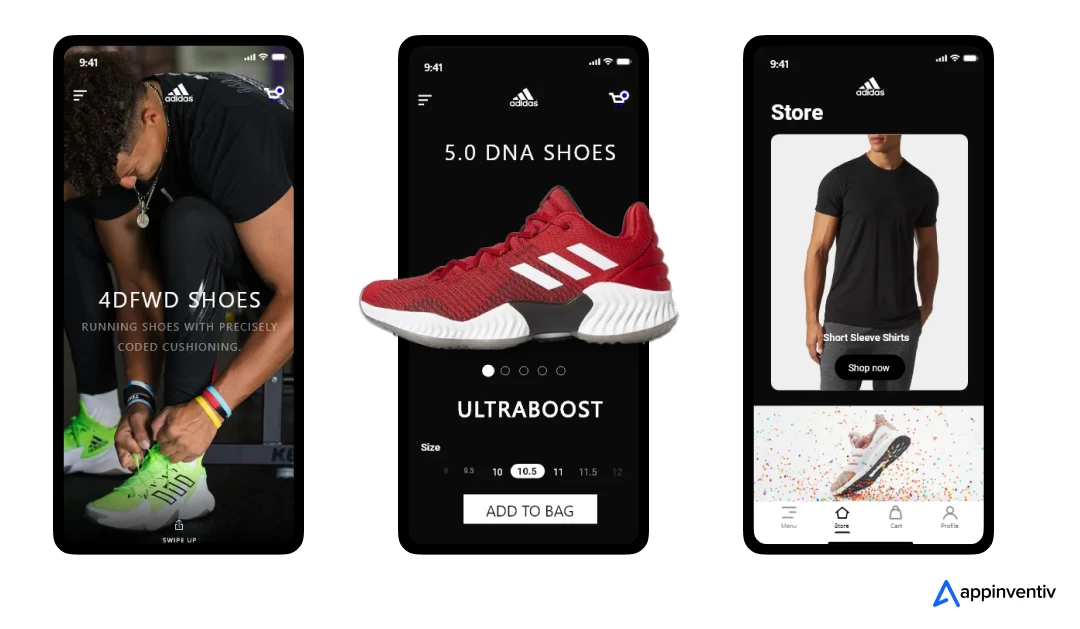
Soniphi Vitality Health App
Appinventiv developed the Soniphi Vitality Health App that leverages bioacoustic technology to analyze 94% of vocal information. This healthcare app provides users with a comprehensive report that gives personalized health insights based on their voice patterns.
The Results?
- Introduced a health evaluation method through voice analysis
- Developed a platform that can process and handle large-scale data.
6th Street eCommerce App
We revamped the 6th Street shopping application, focusing on reducing app start time to less than 3 seconds and enhancing the user experience with new features. Our efforts included fixing issues in existing custom SDKs, implementing analytics, and integrating secure payment gateways and push notifications.
The Result?
- 3+ Million Downloads on iOS
- 1+ Million Downloads on Android
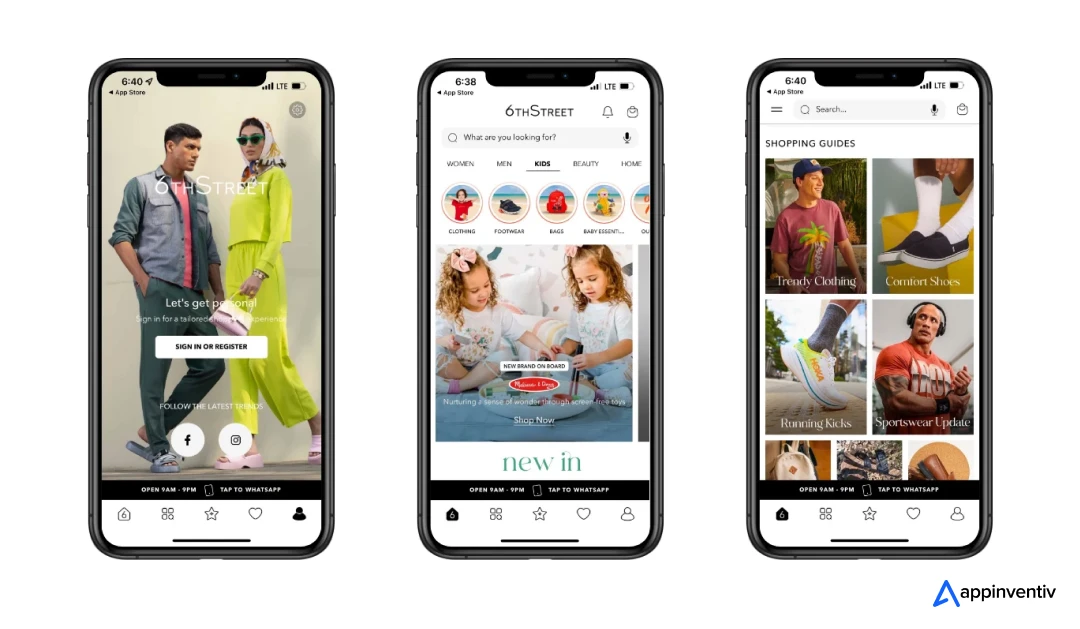
Edfundo Financial Literacy App
We contributed to the development of Edfundo, a financial literacy app designed for children and parents, focusing on money management. Our work would involve building secure financial transaction features, personalized learning modules, and parental control functionalities to foster financial responsibility among young users. This showcases our ability to develop secure and educational financial applications.
The Results?
- $500K Bagged in Pre-Seed Funding
- Recognized as the Best FinTech Startup
Diverse Monetization Strategies for Canadian Mobile Apps
Building a powerful app is an investment, and a smart revenue model is how you turn that investment into a thriving business. It’s not just about recovering your initial cost to develop an app in Canada, but about creating sustainable growth and profit. The Canadian mobile app market is robust, with users spending significant time and money on apps. Crafting the right monetization strategy – or often, a blend of strategies – is critical for long-term success. Here are some of the most effective ways Canadian mobile apps generate revenue:
- Subscription Model: Users pay a recurring fee for access to premium features or content (e.g., Netflix).
- Freemium Model: Basic features are free, with advanced features or an ad-free experience available for a fee.
- In-App Purchases: Users buy virtual goods, extra lives, or premium content within the app.
- Advertising Model: Displaying ads within the app, generating revenue based on impressions or clicks.
- Transaction Fees/Commission: Taking a percentage of transactions facilitated through the app (e.g., Uber, Shopify).
- Paid Apps: Users pay a one-time fee to download the app.
- Affiliate Marketing: Partnering with other businesses and earning a commission on sales generated through your app.
Choosing the right revenue model is crucial for your app’s long-term sustainability and directly impacts your return on the mobile app development cost in Canada.
Maximizing Your Investment: Calculating the ROI for Mobile App Development Cost
When it comes to app development, understanding your return on investment (ROI) is crucial to assessing the success of your project. Here’s how you can calculate the ROI for your mobile app and determine whether your investment is yielding the desired results.
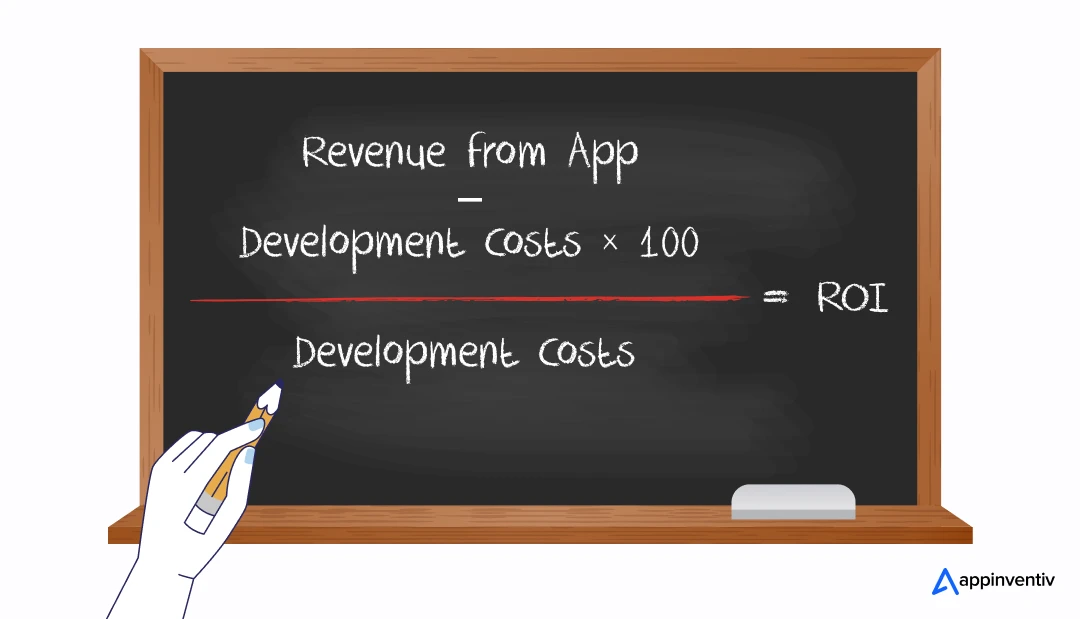
This formula helps you determine the profitability of your app by comparing the revenue it generates against the initial development costs.
For example, if your app generates $150,000 in revenue and your development cost was $100,000, your ROI would be 50%. This straightforward calculation gives you a clear picture of whether your app is delivering a good return on the investment.
Why Partner with an App Development Company like Appinventiv
Estimating the total cost to develop an app in Canada can seem daunting. From the initial spark of an idea to a fully functional, market-ready product, every step involves crucial decisions that impact your budget and timeline.
However, understanding this investment is the first step towards success. By being aware of potential hidden costs and partnering with a reputable mobile app development company in Canada, you can effectively manage your investment.
This is where Appinventiv comes in. We understand the nuances of the Canadian market and the global tech landscape, ensuring your app is not just built, but built for success.
Our proven track record of 3000+ successful projects and clients’ testimonials gives a good glimpse of unmatched excellence in app development. Our team of 1600+ tech experts guides you through every phase of development, from initial cost calculation to post-launch maintenance and beyond.
So, don’t let the complexities of app development cost in Canada deter your vision. Let’s collaborate to bring your app idea to fruition, ensuring a seamless development journey and a product that stands out.
FAQs
Q. How much does it cost to build an app in Canada?
A. The cost to develop an app in Canada generally ranges from $40,000 ($54,000 CAD) for a simple app with basic features. The cost range revolves around $400,000 USD ( $540,000 CAD) for a complex, feature-rich, and highly integrated application. This range is influenced by factors like design complexity, feature set, platform choice, and the hourly rates of the development team.
Q. How long does it take to develop an app in Canada?
A. The timeframe for app development varies significantly based on complexity:
- Simple apps: 4-6 months
- Medium-complexity apps: 6-9 months
- Complex apps: 6-12 months or more.
The entire process includes discovery, design, development, testing, and deployment.
Q. What is the future of mobile app development in Canada?
A. The future of mobile app development in Canada is robust and dynamic. The Canadian mobile application market is projected to grow significantly. A tech-savvy population, strong digital infrastructure, and increasing demand for convenient digital solutions across various sectors drive this growth.
Key trends include the growing adoption of AI and Machine Learning for personalized experiences, increased focus on IoT integration, and the continued rise of low-code/no-code platforms.
Q. How to choose an app development company?
A. Choosing the right app development company involves several key considerations:
- Portfolio and Experience: Look for companies with a strong portfolio of successful apps, especially in your industry.
- Expertise: Ensure they have expertise in the technologies and platforms relevant to your project.
- Communication & Transparency: Opt for a company that communicates clearly, provides detailed cost breakdowns, and uses agile methodologies.
- Client Testimonials: Check reviews and testimonials from previous clients.
- Post-Launch Support: Confirm they offer ongoing maintenance and support.
Q. How to keep app development costs within budget?
A. To manage your app development cost in Canada effectively:
- Start with an MVP: Focus on core features for the initial launch.
- Prioritize Features: Implement essential functionalities first and add more in subsequent phases.
- Consider Cross-Platform Development: Use frameworks like Flutter or React Native to build for both iOS and Android simultaneously.
- Clear Requirements: Define your app’s scope and features precisely to avoid costly changes mid-development.
- Outsource Strategically: Explore outsourcing to cost-effective regions while maintaining quality control.
Q. What are the benefits of developing a mobile app in Canada?
A. Here are some of the most common benefits of developing an app in Canada:
Access to Top Talent: Benefit from Canada’s highly skilled and diverse tech professionals in major innovation hubs.
Large, Engaged User Base: Tap into a digitally-savvy Canadian population with high mobile usage and spending habits.
Robust Digital Infrastructure: Leverage excellent internet penetration and strong median mobile speeds for high-performing apps.
Innovation Hub: Take advantage of significant investments in AI, cloud computing, and emerging technologies.
Favorable Business Environment: Operate within a stable economic climate with clear data privacy regulations (PIPEDA) that build user trust.
Enhanced Customer Engagement: Directly connect with users through notifications and personalized experiences, boosting loyalty.
Competitive Edge: Differentiate your business, streamline operations, and increase efficiency in your industry.
Q: What are some app development challenges in Canada that enterprises face, and how can they overcome them?
A. Enterprises in Canada encounter several key challenges. Here are common challenges and strategies to overcome them:
Challenge: Talent Scarcity for Specialized Skills (e.g., AI, cybersecurity).
- Solution: Invest in upskilling, leverage Canadian agencies, or consider remote talent sourcing.
Challenge: Integration with Legacy Systems (old, complex infrastructure).
- Solution: Adopt an API-first approach and use middleware for seamless data flow.
Challenge: Data Security & Privacy Compliance (PIPEDA, potential CPPA).
- Solution: Implement “Privacy by Design” and conduct regular security audits and penetration testing.
Challenge: Scalability & Performance Demands (handling massive user loads).
- Solution: Build on cloud-native architecture and perform rigorous load testing from the start.
Challenge: Evolving Business Requirements & Agility (needs change mid-project).
- Solution: Embrace Agile methodologies (e.g., Scrum) and maintain continuous stakeholder communication.
Challenge: User Experience (UX) & Adoption (getting employees to use the app).
- Solution: Prioritize user-centered design, provide comprehensive training, and gather continuous feedback.
Challenge: Budget Management & ROI Demonstration (high investment, clear returns).
- Solution: Define a clear MVP (Minimum Viable Product) and track KPIs to demonstrate tangible business value.
Challenge: Post-Deployment Maintenance & Support (ongoing operational costs).
- Solution: Establish a long-term maintenance plan with dedicated resources for updates and bug fixes.


- In just 2 mins you will get a response
- Your idea is 100% protected by our Non Disclosure Agreement.
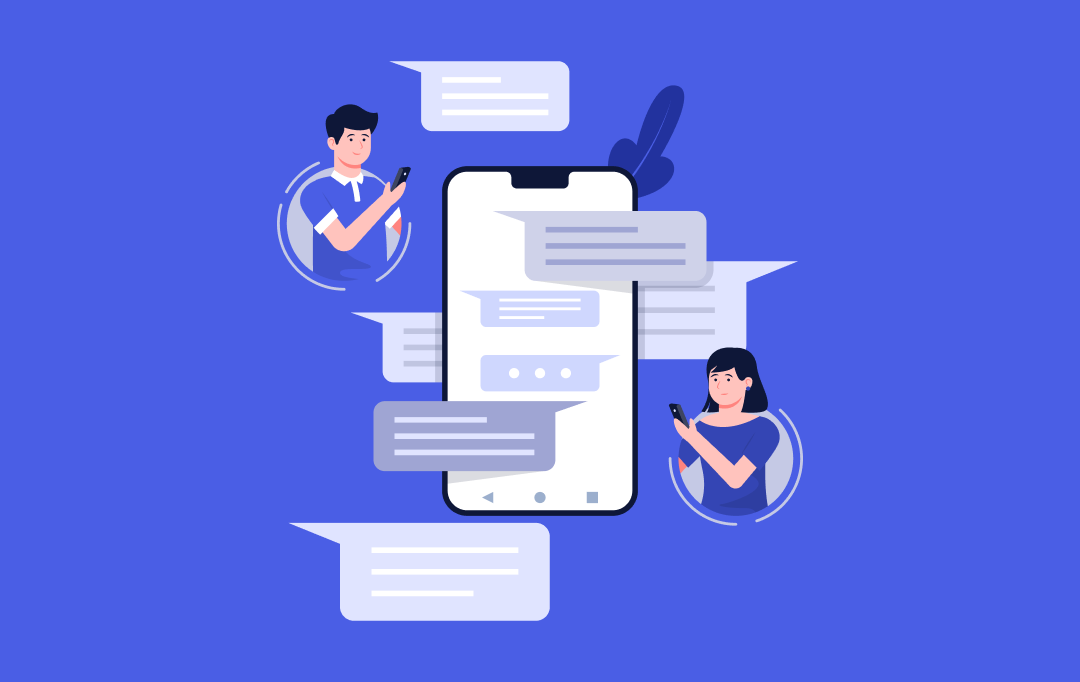
How Much Does It Cost To Build a Chat App Like Arattai?
Key takeaways: Creating a chat app like Arattai will cost you anywhere from $40,000 to $400,000, depending on how complex you want it to be. The essential features you need are real-time messaging, multimedia sending, and user authentication. Layering advanced features such as voice/video calls, group messaging, AI-driven bots, and end-to-end encryption takes the app…

How Much Does It Cost to Build a Car Rental App like Hertz?
Key takeaways: The cost to build a Hertz-like app ranges roughly $40,000–$300,000+. Complexity, automation, and scale matter more than just the number of features. Real costs continue after launch: infra, maintenance, support, and compliance. Smart planning and MVP-first approach help keep budgets under control. Revenue comes from rentals, add-ons, subscriptions, partnerships, and fleet sales. You…

How Much Does It Cost to Build a Banking App like Barclays?
Key takeaways: Barclays sets the bar: Its speed, security, and money management tools show what EU users expect from modern banking apps. Costs vary a lot: A basic, compliant app can start around $40,000 (≈€30,000), while a feature-rich build can reach $400,000+ or more (≈€298,000+). Rules add real work: Meeting PSD2, GDPR, and instant payment…
























